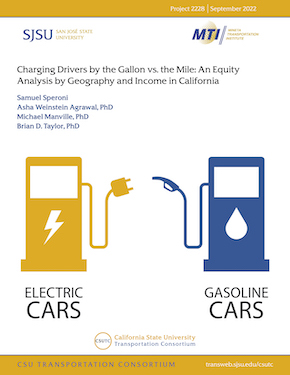- 408-924-7560
- mineta-institute@sjsu.edu
- Donate
Charging Drivers by the Gallon vs. the Mile: An Equity Analysis by Geography and Income in California
This study used data from the 2017 National Household Travel Survey California Add-On sample to explore how replacing the current state vehicle fuel tax with a flat-per-mile-rate road-user charge (RUC) would affect costs for different kinds of households. We first estimated how household vehicle fuel efficiency, mileage, and fuel tax expenditures vary by geography (rural vs. urban) and by income. These findings were then used to estimate how much different types of households pay in the current per-gallon state fuel tax, what they would pay if the state were to replace fuel taxes with a flat-rate road-usage charge (RUC) that would generate revenues similar to the current state fuel tax (2.52¢ per mile driven), and the difference in household expenditures between the fuel tax and RUC.
We find that rural households tend to drive more miles and own less fuel-efficient vehicles than urban ones, so they pay comparatively more in fuel tax and would pay more with the RUC as well. However, this rural/urban variation is less for the RUC than the fuel tax, so moving to a flat-rate RUC would redistribute some of the overall tax burden from rural households (that drive more miles in fuel-thirsty vehicles) to urban households (that drive fewer miles in more fuel-efficient vehicles). Transitioning from the fuel tax to RUC would also generally shift the fuel tax burden from lower-income to higher-income households, with one exception: expenditures would rise for low-income urban households. However, the variation in the tax incidence between the gas tax and RUC is quite modest, amounting to less than one dollar per week for both urban and rural households at all income levels.
SAMUEL SPERONI
Samuel Speroni is a doctoral student in the Department of Urban Planning at UCLA, a researcher at the Institute of Transportation Studies at UCLA, and a researcher at the Mineta Transportation Institute. He researches travel behavior, transportation finance, and school transportation, with a special focus on investigating the equity implications within each of those areas. He earned his master’s degree in Urban and Regional Planning from UCLA and a bachelor’s degree with honors in Urban Studies from Brown University.
ASHA WEINSTEIN AGRAWAL, PHD
Dr. Agrawal is Director of the MTI National Transportation Finance Center and also Professor of Urban and Regional Planning at San José State University. Her research and teaching interests in transportation policy and planning in-clude transportation finance, bicycle and pedestrian planning, travel survey methods, and transportation history.
MICHAEL MANVILLE, PHD
Michael Manville is Associate Professor of Urban Planning at the UCLA Luskin School of Public Affairs. Both his research and teaching focus on the relationships between transportation and land use, and on local public finance. Much of his research concerns the tendency of local governments to hide the costs of driving in the property market, through land use restrictions intended to fight traffic congestion. These land use laws only sometimes reduce congestion, and can profoundly influence the supply and price of housing. Dr. Manville has an MA and PhD in Urban Planning, both from UCLA Luskin. Prior to joining Luskin as a faculty member, he was Assistant Professor of City and Regional Planning at Cornell University.
BRIAN TAYLOR, PHD
Brian Taylor is Professor of Urban Planning and Public Policy, and Director of the Institute of Transportation Studies at UCLA. Professor Taylor’s research centers on transportation policy and planning – most of it conducted in close collaboration with his many exceptional students. Professor Taylor explores how society pays for transportation systems and how these systems in turn serve the needs of people who – because of low income, disability, location, or age – have lower levels of mobility. Topically, his research examines travel behavior, transportation economics and finance, and politics and planning. Prior to joining the UCLA faculty, Professor Taylor was a planning faculty member at the University of North Carolina at Chapel Hill, and before that he was a planner with the Metropolitan Transportation Commission in the San Francisco Bay Area.
-
Contact Us
San José State University One Washington Square, San Jose, CA 95192 Phone: 408-924-7560 Email: mineta-institute@sjsu.edu






